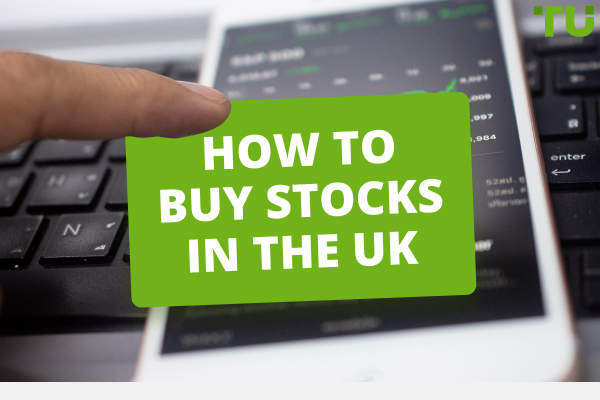How to Buy Stocks in Poland
How to buy stocks in Poland:
-
You must first research and compare a stock broker.
-
Sign up with an online broker.
-
To start buying stocks, you must first fund your live trading account.
-
Find and select the shares you want to buy.
-
Place a share purchase order after determining how many shares you want to buy.
Investing in stocks can be a potentially lucrative venture, but for those looking to expand their portfolio into international markets, understanding the process can seem daunting. If you have ever wondered how to jump into the world of stock market investments in Poland, well, you're in the right place. In this step-by-step guide, we will walk you through the process of buying stocks in Poland, from selecting the best stock trading platform to opening an account and making your first trade. Whether you're a novice investor or an experienced trader, this comprehensive guide will explain the world of Polish stocks and help you get started on your investment journey.
Want to buy stocks? Open an account with RoboForex!How to buy stocks online in a few easy steps
1. Choose an online stock broker
To begin investing in stocks, you need to select an online stock broker. Look for a broker that offers a user-friendly interface, low fees, good customer service, and a wide range of investment options. It is essential to ensure that the broker is regulated and operates within your country's jurisdiction.
For beginners, brokerages with extra benefits such as social trading can be invaluable as they offer opportunities to learn from experienced traders, as well as study best strategies. Additionally, access to comprehensive educational resources, fractional shares trading, and a diverse range of ETF investment options can further empower beginners in making well-informed and diversified investment decisions.
2. Sign up for an account
Once you have chosen a suitable broker, you'll need to sign up for an account. The registration process typically involves providing your personal information, which may include:
Your full name;
Address and contact details;
Date of birth;
Social Security number (or equivalent);
Proof of identification (such as a driver's license or passport);
Employment and material status information is optional.
Keep in mind that some brokers might require mandatory verification of your identity and documents.
3. Make your first deposit
To pay for the stocks you want to purchase, you'll need to deposit funds into your brokerage account. Most brokerages offer various funding options, such as bank transfers, credit/debit cards, or wire transfers.
Bank Transfers: Usually free or low-cost, but may take a few days to clear.
Credit/Debit Cards: Instant, but may involve additional fees.
Wire Transfers: Instant, but may involve additional fees.
How much money should I deposit for the first time? TU experts recommend starting with a small amount to understand the stock market and gain practical experience.
4. Choose the stocks you want to buy
With your account funded, it's time to choose the stocks you want to buy. You can use your brokerage's research tools or other financial websites to gather information about potential investments. Take into consideration factors like your budget, risk tolerance, and long-term investment goals when making your decisions.
If you are inclined towards long-term investing, it is essential to focus on conservative trading strategies, prioritize portfolio diversification, and thoroughly understand the businesses of the companies you invest in. On the other hand, if you prefer active trading, consider learning technical analysis or other techniques to make informed decisions and navigate the dynamic nature of the stock market effectively.
5. Place your orders to buy stocks
There are different types of orders you should understand:
Market order executes the buy order at the current market price. It prioritizes execution speed over price, ensuring immediate execution.
Market order use case: Investors who want to enter or exit a position quickly, especially in highly liquid stocks.
Limit order sets a specific price at which the investor is willing to buy or sell a stock. It allows investors to control the price at which the trade will execute, offering price protection.
Limit order use case: Traders who want to buy or sell at a specific price and are willing to wait for the market to reach that price.
Stop order (stop-loss order) executes the order when the stock reaches a specified price. Stop orders are used to limit potential losses by triggering a sale if the stock's price moves unfavorably.
Stop order use case: Traders who want to protect their investments from significant price declines.
6. Monitor your investments
The stock market can be volatile, and the value of your holdings may fluctuate. Stay informed about the companies you've invested in and keep an eye on market trends. Remember that investing is a long-term endeavor, and it's essential to review and adjust your portfolio periodically based on your financial goals and risk tolerance.
By following these steps and staying informed, you can start your journey into the world of online stock investing. Remember that investing involves risks, and it's crucial to do thorough research and seek professional advice if needed. Happy investing!
How do I sell my stocks in Poland?
Selling your stocks in Poland involves a series of steps to ensure a smooth and successful transaction. Here's a step-by-step guide to help you navigate the process:
Access your brokerage account: Start by logging into your brokerage account, where you hold the stocks you want to sell. If you don't have an account yet, you'll need to open one with a Polish brokerage firm.
Select the stocks to sell: Within your account, navigate to the trading platform and select the specific stocks you wish to sell. You'll usually find a "sell" or "trade" option.
Specify order details: Determine the quantity of shares you want to sell and set the price at which you're willing to sell them. You have several order options, including market orders (selling at the current market price) or limit orders (selling at a specific price or better).
Confirm the order: Review all the order details carefully before confirming the sale. Ensure that the information is accurate, including the number of shares and the selling price.
Place the order: Once you're satisfied with the order details, submit the sell order. Your broker will process the order, and it will be executed when the specified conditions are met.
After the sale is executed, the funds from the sale will typically appear in your brokerage account. You can then transfer them to your bank account or reinvest them as desired.
Best stock brokers in Poland



Rules and Regulation
Licensing in Poland
Forex trading in Poland is overseen and regulated by two authorities: the Polish Financial Supervision Authority (KNF) and the National Bank of Poland (NBP). These regulatory bodies play crucial roles in monitoring and supervising Forex trading activities to ensure compliance with established financial regulations and standards.
Investor protection in Poland
The regulatory framework established by the KNF in Poland aims to protect investors engaged in Forex trading. Through stringent regulations and oversight, the KNF endeavors to maintain transparency, integrity, and fairness in the Forex market, thereby safeguarding the interests of investors and promoting trust in the financial system.
Taxation in Poland
Profits derived from Forex trading activities are subject to income tax in Poland. The tax rates applicable to Forex trading profits range from 18% to 32%, depending on the total amount of profit earned by the trader. Compliance with tax regulations is essential for Forex traders in Poland to fulfill their tax obligations and avoid any legal consequences.
What are the benefits of buying stocks in Poland?
Investing in Polish stocks can be an attractive option for both domestic and international investors due to several compelling benefits highlighted by the Traders Union below:
Strong economy: Poland boasts a robust and resilient economy. Over the past few decades, the country has experienced consistent economic growth, making it one of the most promising emerging markets in Europe. Its strong economic fundamentals, including a large and well-educated workforce, make it an appealing destination for investors seeking stable returns.
Global export leader: Poland is a global export leader, with a diverse range of products and services finding their way to international markets. Its strategic location within Europe and membership in the European Union (EU) have facilitated trade partnerships, creating ample opportunities for companies and, consequently, investors.
Stable political environment: Political stability is a crucial factor for investment, and Poland has a relatively stable political environment. As a member of the EU and NATO, Poland benefits from a well-established legal and regulatory framework that supports business growth. This stability enhances investor confidence in the country's financial markets.
Diversification: Investing in Polish stocks allows you to diversify your portfolio geographically. Diversification is a risk management strategy that can help spread risk across different markets and industries. By including Polish stocks in your investment portfolio, you can reduce your exposure to the performance of any single market or economy.
Dividend yields: Some Polish companies offer attractive dividend yields to shareholders. Investing in dividend-paying stocks can provide a steady stream of income, which can be particularly appealing to income-oriented investors.
Is it safe to buy stocks online?
Yes, in general, stock investing is safe, but you should learn some basic safe investing rules that will help protect your money.
Research and select a well-established, reputable online brokerage platform with a track record of security and customer satisfaction.
Buy stocks using a secure internet connection, preferably your private home network, to reduce the risk of unauthorized access or data interception.
Create strong and unique passwords for your brokerage account, incorporating a combination of letters, numbers, and special characters.
Enable 2FA whenever possible. This adds an extra layer of security by requiring a second form of verification, such as a code sent to your mobile device, before accessing your account.
When funding your brokerage account or making transactions, use secure payment methods such as bank transfers or credit cards. Avoid sharing credit card details directly with third parties.
Be cautious about sharing unnecessary personal information online, especially on social media platforms, to minimize the risk of identity theft or fraud.
Keep a close eye on your brokerage account's activity. Regularly review statements and transaction history for any unauthorized or suspicious transactions.
Educate yourself about common stock frauds and phishing attempts related to stock trading.
Can Poles trade stocks with international brokers?
Residents of Poland have the opportunity to trade stocks with international brokers, opening doors to a world of investment possibilities. However, navigating this terrain requires a keen understanding of crucial considerations, including regulations, tax implications, and trading costs. It's imperative for investors to collaborate with reputable and trusted companies, such as eToro and others, to ensure a secure and legal trading experience.
What is the minimum stock investment in Poland?
The minimum stock investment in Poland can vary depending on several factors, including the brokerage you choose and the specific stocks or investment products you're interested in. Typically, Polish brokerage firms offer various account types to cater to investors with different budgets.
Can I trade fractional shares?
Investors often wonder if they can participate in the stock market without committing to purchasing whole shares of stock. The good news is that in Poland, as in many other countries, trading fractional shares has become increasingly accessible. Some reputable brokers, including eToro and a select few others, offer investors the opportunity to trade fractional shares.
How to buy US Stocks in Poland?
Many Polish citizens are intrigued by the prospect of investing in US stocks, often wondering if it's possible for non-US citizens to do so. The good news is that, as a Polish citizen, you have the opportunity to invest in US stocks without being a US citizen. The US stock market, including exchanges like the New York Stock Exchange (NYSE) and Nasdaq, is accessible to international investors. Here's how you can get started:
Choose a reliable brokerage: The first step is to select a reputable brokerage that caters to international clients. Look for brokerage firms that offer access to US markets and provide services for non-US residents. Popular choices among international investors include eToro, and Interactive Brokers, among others.
Open a brokerage account: Once you've chosen a brokerage, you'll need to open an account. This typically involves providing the necessary identification and financial information. The process may vary among brokers, but it's generally straightforward.
Fund your account: After your brokerage account is set up, you'll need to deposit funds into it. You can transfer money from your Polish bank account to your brokerage account. Most brokerages accept deposits in various currencies, including Polish złoty (PLN). Be aware of any currency conversion fees that may apply.
Research US stocks: Before investing, conduct thorough research on the US stocks you're interested in. Evaluate companies, industries, and stock performance to make informed investment decisions.
Place orders: Using your brokerage's trading platform, you can place buy orders for the US stocks you wish to invest in. You can specify the quantity of shares and the type of order (market order, limit order, etc.). Review your order carefully before confirming.
It's important to note that while US stocks are accessible to international investors, there may be certain regulations and tax implications to consider. Additionally, brokerage fees and currency conversion costs can vary, so it's wise to compare offerings from different brokerages to find the most suitable option for your needs.
Are shares taxed in Poland?
The purchase of shares is subject to a 1% Transfer Tax in Poland, which is imposed based on the market value of the acquired shares. The Transfer Tax is required to be settled within a 14-day timeframe by the buyer. In cases where the sale agreement is formalized through a notary, the Transfer Tax will be handled by the notary at the time when the notarial deed is signed.
FAQs
How to invest in stocks in Poland?
To invest in Polish stocks, open a brokerage account, fund it, and buy stocks through the brokerage's platform.
Is it good to invest in Poland?
Investing in Poland offers potential benefits, but it's essential to research and assess your goals and risk tolerance.
Does Poland have a stock market?
Yes, Poland has a stock market and it is called the Warsaw Stock Exchange (GPW) for trading stocks.
How can I buy stocks in Europe?
To buy European stocks, open an account with a brokerage offering European market access, fund it, and start trading European securities through their platform.
Team that worked on the article
Winnifred Emmanuel is a freelance financial analyst and writer with years of experience in working with financial websites and businesses. Her expertise spans various areas, including commodities, Forex, stocks, and cryptocurrency. Winnifred tailors her writing to various audiences, including beginners, while also providing useful insights for those who are already familiar with financial markets.
Dr. BJ Johnson is a PhD in English Language and an editor with over 15 years of experience. He earned his degree in English Language in the U.S and the UK. In 2020, Dr. Johnson joined the Traders Union team. Since then, he has created over 100 exclusive articles and edited over 300 articles of other authors.
Mirjan Hipolito is a journalist and news editor at Traders Union. She is an expert crypto writer with five years of experience in the financial markets. Her specialties are daily market news, price predictions, and Initial Coin Offerings (ICO).









